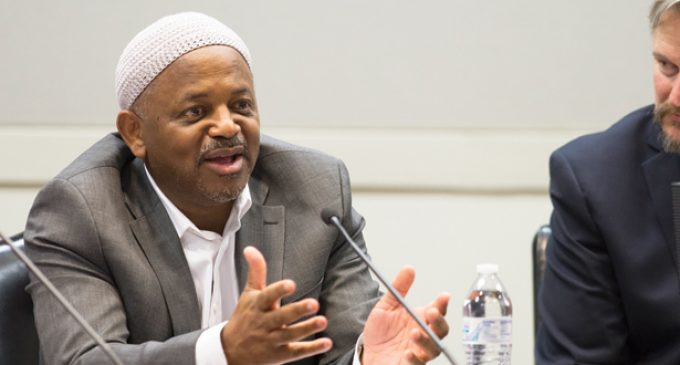Diverse panel of clergy discuss intolerance and religious extremism

(Above: Carl Lut Williams speaks.)
A diverse panel of faith leaders discussed religious extremism Monday night, March 30, at the Stuart Building in .
“I Have a Question About … Religious Extremism” was part of a series of forums held by the Winston-salem Human Relations Commission that answers questions on different religions.
Moderator Timothy Auman, a Human Relations commissioner and Wake Forest University chaplain, said that extremism can be found in the United States. He said the Southern Poverty Law Center estimates that the number hate groups has grown 60 percent since 2000 and about 20 percent of hate crime attacks were motivated by religion in 2010.
The panel consisted of Rev. Nathan Parrish of Peace Haven Baptist Church, Dr. John Mendez of Emmanuel Baptist Church, Rev. Fermin Bocanegra of Iglesia Cristiana Wesleyana, Salem College Chaplain Rev. Amy Rio-Anderson, Islamic Center of Greensboro co-founder Carl Lut Williams and Rabbi Andrew Ettin of Temple Israel in Salisbury.
Williams said Islamic extremism is very rare in this country but in other countries it’s become prevalent. He said Islam is in a struggle with itself.
“This topic of religious extremism is one, I think you can imagine many reasons for why, Muslims are wrestling with this on a regular basis,” he said.
Bocanegra said he’s experienced Christian extremism firsthand. He fled his home country of Peru because of the sometimes violent persecution he faced as a Protestant in the Catholic nation. He said intolerance can take many forms in Christianity, including churches he saw in Mexico that don’t allow women who wear pants. He said as a local pastor, he’s held games to bring together local churches and communities of faith in hopes of bridging religious divides.
Rio-Anderson said that Salem, a women’s college founded by Moravians in 1772, has a diverse student body that’s learned tolerance of cultural and religious differences, She said she’s still met some who’ve had a hard time accepting she was a minister, even thinking that it was unbiblical for a woman to preach.
“When religious extremism rears its head, women are usually at the forefront, taking the brunt of that,” she said.
Rabbi Ettin also said getting to know others was key in combating extremism. He said growing up in an ethnically and religiously diverse community in Newark, N.J. helped him gain an understanding and appreciation of other cultures. “None of the stereotypes made sense when you came out of that type of experience,” he said.
Parrish grew up in a small rural N.C. town that was the opposite, with the only diversity of religion being some churches were Protestant and some were Baptist. He said as he grew older, he got to know and work with people of other faiths.“I have been brought into communities and into relationships that have deepened and challenged and caused me to reflect more about not only the faith of other people, but about my own faith commitment in relationship with persons of other faiths,” he said.
Dr. Mendez said religious intolerance fits into a pattern of oppression and violence in the history of the United States that has been especially felt by minorities.
“So much of what we’re talking about right now, I think, is predicated on how we understand God and we use God, in many ways, to defend our causes,” he said.He said he saw hope in the new generation for coming together and understanding one another.
He said protests he went to in Ferguson, Missouri, gave him hope as he saw mostly young protestors of all different races and walks of life holding up signs about the value of black life.
“I’m ready to follow them,” he said.











